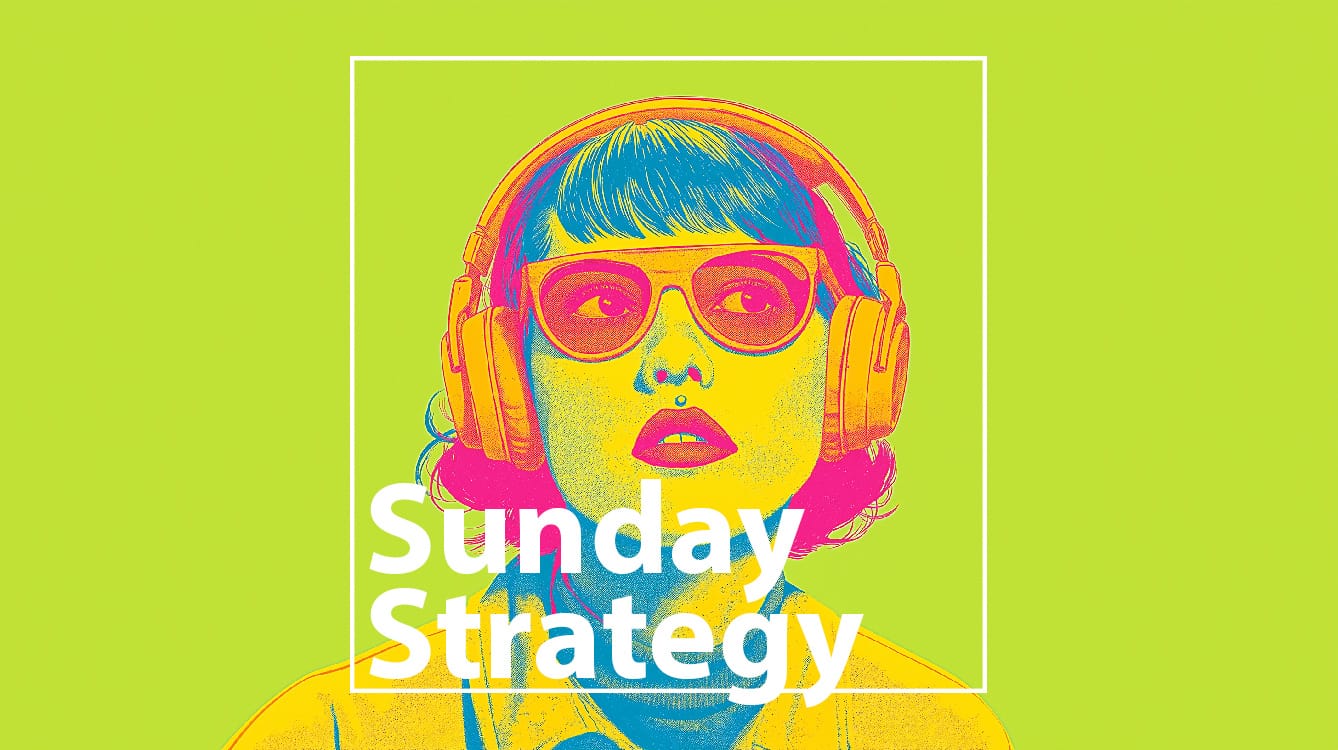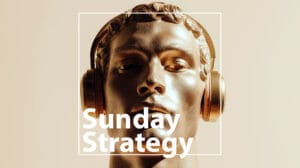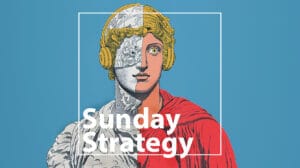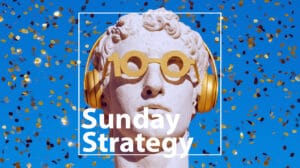In this long (US) Labor Day weekend issue of Sunday Strategy, we look at four stories to think about next week, including: Anemoia and 90s fantasy, Eau de Corgette, Permanent Pandemic Disruption, a Good AI Slowdown and the Netflix Algo vs. Creative Filmmaking.
In addition, we have ads from: Trainline, Minecraft, Spotify, Fiverr and Tinder.
// Stories of the Week:
1.) It’s Not 90s Nostalgia, It’s 90s Fantasy
90s culture is seemingly everywhere, as nostalgia carries 90s memes, moments and celebrities back to the forefront. While it inspires everything from food to fashion, do we actually miss the 90s or an idealized version of what the 90s could have stood for? As even Gen Z, a generation that never actually experienced the decade, looks longingly at it, it’s more likely we’re idealizing a time pre ubiquitous technology and internet than reliving real 90s culture.
The 90s fantasy we’re collectively constructing means that more creative freedom exists to reinvent and upgrade the 90s than faithfully reconstruct it, as Instacart (targeting parents passing on 90s traditions) and Vera Bradley (bringing a 90s teen love fantasy to life with adults) have done.
Using the 90s to speak about a simpler, more idealized time is another iteration of an age old tradition, updating the ‘Good old days’ fallacy to the time of Nirvana, MTV’s Dan Cortese and AOL. It shows our tendency for anemoia, longing for times that didn’t exist, but it frees marketers to fantasize instead of recreate (tapping into values of disconnection and freedom) and allows brands that weren’t there to pretend they were – until we inevitably move on to removing the cringe from ‘early 2000’s millennial cringe’ that is.
2.) Eau De Corgette: The Rise of Food Fragrances and GLP-1.
Is a growth in GLP-1 use driving an increase in ‘gourmand’ style food fragrances? Mintel’s recent ‘Future of Fragrances’ report claims a relationship between the growth of weight loss drugs and food note heavy perfumes, implying that as more consumers cut back on consumption, they’re finding other ways to ‘enjoy’ the sensorial elements of a meal.
3.) When Pandemic Disruption Becomes Permanent.
Will we ever go back to the way things were before the Covid-19 pandemic? In some ways we have, but in many ways, the world has been reshaped permanently five plus years on. McKinsey’s 2025 ‘State of the Consumer’ report shows that many behaviors described as ‘pandemic disruption’ have simply become the everyday reality for many. People are still spending more time alone and online, with in-person dining still recovering from the pandemic (down 3% since 2019) vs. delivery (up 19%) and drive through (up 7%) globally. This isn’t to say a remote relationship with our social circle has decreased their influence on our lives (McKinsey shows that they still most heavily influence our decisions vs. wider social media), but that the influence works asynchronously.
Spending behaviors have also shifted local and impulsive during post pandemic years, as many markets increasingly prioritise local businesses and individuals say despite economic worries, they’re prepared to splurge when needed. The economic elements of this report may be the key to understanding permanent shifts – as global disruption to the job market and economy post Covid has yet to stabilize. While its easy to claim that we shifted in behaviour on our own, it’s more likely that continuing financial disruption has locked in adaptive behaviors as the new norm. What was once an adaptation to Covid’s chaos is now an adaptation to economic uncertainty.
4.) Is the AI Slowdown a Good Thing?
AI growth is reportedly slowing, but this may be a good thing. As the AI hype cycle seemingly wanes, with pilot projects failing in enterprise, brands rethinking its deployment and a growing gap forming between heavy and non-users – are we poised to see a new phase in how AI interacts with our lives?
While we’re still trying to answer big questions about the role AI plays in our lives and work, as well as even the existential nature of AI itself; it may be tempting to label the slowdown as another example of technology overhyping its impact, similar to NFTs, blockchain and Cryptocurrency’s previous waves.
However, the real impact of a technology unfolds much more slowly than the hype around it. Use is quiet while potential is loud. Even if development stopped today, the AI models we have available will inevitably continue to change how we live and work. The real value of a technology however, is often what happens when it continues to quietly develop beyond the noise. An AI slowdown may constrict funding to new startups and condense power into the hands of fewer, well funded platforms, but it also represents a cooling of inflated expectations and FOMO in companies aiming to integrate it. The real chapter of AI may be beginning as the noisy ‘first’ chapter ends.
5.) The Netflix Algorithm vs Unexpected Films
What happens when a data company, rich in understanding of what people currently watch, becomes one of Hollywood’s most prolific studios? The Guardian highlights how Netflix’s data-driven approach to filmmaking has created a new category of “algorithm movies” – generic, forgettable films designed to appeal to the broadest possible audience through using familiar components. The ‘gourmet cheeseburger’ of familiar comfort films, like the big budget ‘Electric State’ are blockbuster like objects, but often lack the twists and turns others have to inject novelty.
Despite a tagging system of over 77k “alt genres”, Netflix runs the risk of pulling towards the average in what they make (due to pressure to keep attention), vs. using their breadth to challenge and expand users’ film consumption. Before we accuse Netflix of killing original films however, we have to ask if that’s what we’re asking them to make for us?
// Ads You Might Have Missed:
1.) ‘Fan Life’ – Spotify:
Streaming platform Spotify has shifted the spotlight from the artists it streams to their fans in their latest campaign. ‘Fan Life’ celebrates the fandoms and rituals built up around different artists, from wider acts like Charli XCX, Sleep Token, Pitbull, Bad Bunny and others. It doesn’t explicitly call out fandoms, but highlights the context and behaviour around the music, such as Pitbull fans famously wearing bald caps to his concerts.
The series looks to embed itself deeply in local acts and serve as fan service, while the brand expands what it offers on platform, from music to exclusive content, merchandise and tickets. Spotify’s journey to expand its footprint in listener’s lives has gone in different directions, from ‘Listen like you used to’ (expanding the back catalog) to podcasts (expanding types of listening), but fan service and music lifestyle may be a space where their data and history with listeners works well.
2.) ‘Cube Claim’ – Minecraft:
How many cube puns can you make? Well, if you’re Minecraft’s latest campaign featuring ‘Ice Cube’, making insurance ‘cube claims’ from his ‘Ice cubicle’, the reality is pretty impressive. Their latest campaign ‘Ice Cube Claims Adjuster’ names the 90s rapper as an insurance adjustor, wanting videos of your in-game death and accidents.
The social campaign aims to solicit footage of in-game adventures and accidents, while also functionally supporting gamers with a plugin / NPC in-game which can retrieve items. For a property constantly trying to put itself on the front foot of gamers’ minds, from film and toys to advertising, the social first campaign does gaming footage with a celebrity twist. Though imagine the parents that have to explain Cube’s journey from ‘Straight Out of Compton’ to the ‘Ice Cubicle’.
3.) ‘Prompt & Punishment’ – Fiverr:
The AI market might reportedly be slowing down, but AI hatred and conversations around ‘AI slop’ seemingly keep hitting new market highs. For freelance site Fiverr, AI hatred and AI use collide in their latest campaign, attempting to thread the needle between showing how bad AI can be and championing the experts they have to use it well. ‘Prompt and Punishment’ features GenAI character Gary as he suffers through an ‘uncanny valley’ of torment, all while discussing the value of AI.
The ads’ obvious AI aesthetic works to its advantage, as it becomes a clear object of hate for anyone calling out AI ‘slop’. The wider question is if those open to the potential of AI, now and in the future, want a punching bag or if Fiverr has decided to speak to an audience they can never win over?
4.) ‘Tongue Tied’ – Tinder:
In its latest ads, Tinder wants you to find a ‘tongue tying crush’ on its platform. The dating site, often considered more for hookups than romance, has attempted to reclaim romance credentials in recent years, challenged by everything from dating app fatigue to a ‘romance recession’. In a world where many, especially amongst its younger audience, may find it outdated – the new campaign is notably ‘old fashioned’ and cute. Featuring a couple of literally ‘tongue tied’ Gen Z holding hands and crushing, it looks to reclaim an innocence that it had previously shed – still attempting to own the moment of a ‘spark’ and ‘swipe’ vs. other dating apps that court more ‘intentional daters’ with outcome based messaging.
5.) ‘Tap That App’ – Trainline:
Think the Jingle is dead? Rail and Coach ticket platform Trainline has taken a novel approach to championing their ‘Delay Repay’ feature, creating a song and music video that drives listeners to ‘Tap that App’ when their travel is delayed. The brand has committed to more than the song itself, as it enlisted buskers at 7 train stations to perform the song in their own way, as well as sharing it on Spotify and broadcasting it on UK radio. While it may not ever become the ‘song of the summer’, the lyrics and beat are finely tuned to work with a heavy frequency media campaign to get fingers tapping to the beat or travel delays.
// Sunday Snippets
// Marketing & Advertising //
– Waitrose and Alex Horne (ft. the Horne Section) wants you to know Waitrose chicken checks out in a jazzy new tune [Ads]
– Primark continues this week’s streak of releasing a denim ad with no mention of genetics. Good job everyone. [Fashion]
– US Insurer State Farm continues their insurance quality comparison ads with Megan Trainor vs. athletic trainers for the Chiefs [Ads]
– Chipotle targets campus loyalty with “Chipotle U Rewards” and an Urban Outfitters student dorm collaboration [Partnerships]
– A new challenger enters the denim advertising wars, as Lucky launch with Tate McRae [Ads]
– YouGov breaks down American attitudes to the Sydney Sweeny ‘Good Jeans’ ad [Research]
– Billy Bob Thorton goes full ‘Landman’ (or just very Billy Bob Thorton) in a country road testimonial about T-mobile’s network that acknowledges a competitor [Ads]
– Why Japan and Korea are outsmarting Western brands with mascots [Branding]
– Energy drink Celsius puts their NIL roster on show with an ad celebrating the return of College Football [Ads]
– German consumer sentiment continued to decline in August to -23.6 [Research]
– How African e-commerce giant Jumia is fighting off Temu and Shein [Marketing]
// Technology & Media //
– If you think the internet has lost its wonderful weirdness, make more of what you want to see on it [Social Media]
– TikTok has upgraded its DM channels to be more of a creative avenue [Social Media]
// Life & Culture //
– Is 2025 the ‘Summer of Nothing’? [Culture]
– What’s driving MDMA’s comeback in the UK? [Culture]
– Inside the ‘Dorm Room’ industrial complex, where parents are spending more and more to kit out US student dorm rooms [Education]
– With back to school, ‘campus has become the new catwalk’ according to the Guardian and met with a sigh of disbelief from worn uni hoodies and sweatpants everywhere [Fashion]
// Until Next Sunday
As always, let me know what you think by email (dubose@newclassic.agency), website or on LinkedIn.You can also listen to an audio summary and discussion of each week’s newsletter on Spotify. We’re also on TikTok!





